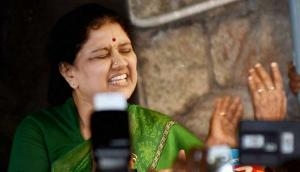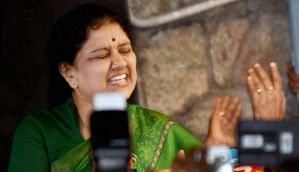NIT Srinagar to stay in Srinagar: HRD min to protesting students
Protesting non-Kashmiri students at NIT Srinagar were disappointed on Saturday when the Union HRD ministry rejected their proposal to shift the campus out of Kashmir.
The students had met officials of the state and central governments on Friday. State education minister Naeem Akhtar said that the board of governors would meet the students to discuss their issues.
“I am glad we have a sensitive HRD minister at the Centre who has stationed some officials here to reach out to students. We are also here to provide assistance,” Akhtar said. The government will form a students’ grievance cell, according the Hindustan Times.
Jaya promises prohibition in TN if voted back to power
Tamil Nadu chief minister and AIADMK head J Jayalalithaa said on Saturday that she would ban liquor in the state if she was voted back to power.
Prohibition would be introduced in phases, she added. “Timings of liquor shops will be reduced, bars will be closed, rehabilitation centres opened and the number of liquor outlets reduced,” she said at a rally.
Last year, Nitish Kumar, now chief minister of Bihar, had promised during his assembly polls campaign to ban liquor. As of 1 April this year, he had made good on his promise.
122 Bastar Maoists surrender
Police stations in the Bastar range of Chattisgarh saw an unprecedented 122 Maoists come in to surrender on Saturday.
Many of them had been involved in acts of violence and had a price on their heads, said Inspector General of Police Bastar range SRP Kalluri.
Since they have surrendered, they will be provided with assistance and rehabilitation, according to ANI.
Odd-even may soon be in place 15 days a month
Delhi’s odd-even road rationing scheme which begins its second phase on 15 April may return for 15 days every month, said chief minister Arvind Kejriwal on Saturday.
The scheme that was initiated in January this year aims to help bring down air pollution by allowing vehicles with registration plates ending with odd numbers and those ending with even numbers to ply only on alternate days of the week, excepting Sundays. Vehicles that run on CNG, and those driven by women, are exempt from the scheme, according to the Hindustan Times.
Kollam tragedy: Early morning temple fire due to fireworks kills 102
A fire caused by crackers at Kerala’s Puttingal temple in Paravur, Kollam, killed at least 102 people and injured hundreds in the early hours of this morning.
The fire began at about 3 am next to the temple where people had gathered for a festival and a night of fire crackers.
"A spark from the crackers being burst fell into the stack of crackers kept in a makeshift compartment at the ground, triggering the fire. The space was an open group and people could run away," said a police official.
IPL matches in Maha will raise Rs 100 crore, could be used for drought relief: BCCI
BCCI secretary Anurag Thakur said on Saturday that should the IPL’s matches be shifted out of Maharashtra, the state will lose around Rs 100 crore which could be spent on drought relief.
"Maharashtra gains Rs 100 crore from IPL and if the tournament goes out of the state, it will be a loss," Thakur said. The figure he quoted was based on a BCCI study after 2015’s IPL.
The Maharashtra government is facing criticism for allowing 18 IPL matches to be played in Mumbai, Pune and Nagpur, which would mean using 65 lakh litres of water for pitch preparation, even as the state suffers drought, according to NDTV.
Rural women will be Special Police Officers to fight gender crimes
Women in rural areas across the country will be recruited by the government to serves as special police officers (SPOs) in an effort to stop gender crimes, by acting as a link between the villages and the police.
They will be unarmed, but trained by the local police. They will earn Rs 500 per month. “If some states want, they can increase the money,” said a government official. “They will not be regular employees.”
The idea had been mooted by the Women and Child Development Ministry some time ago, but only received the Home Ministry’s approval last week, says the Hindustan Times.
New mosquito trap that can help fight Zika spread
A team of researchers has come up with a new mosquito trap that could be used to help slow the spread of the Zika virus around the globe. Developed by Argentinian researchers from the Centro de Investigaciones de Plagas e Insecticidas, the trap can be used to effectively monitor and control the Aedes aegypti mosquito, which is the primary transmitter of Zika, dengue, chikungunya, and yellow fever. The plastic ovitrap is a small cup made of low-density polyethylene (LDPE) that has been infused with the larvicide pyriproxyfen.
When the cup is filled with water, the larvicide is immediately released from the plastic. Female Aedes aegypti mosquitoes prefer to deposit eggs in small containers such as pots and tires that contain water, so the trap is an attractive egg-laying location. The trap is described in the Journal of Medical Entomology.
India, China, US, Brazil account for half of the world's adults with diabetes
A new report has revealed that since 1980, the number of adults with diabetes worldwide has quadrupled from 108 million to 422 million in 2014. Senior author Majid Ezzati, from Imperial College London, London, UK, said, "Rates of diabetes are rising quickly in China, India, and many other low and middle income countries, and if current trends continue, the probability of meeting the 2025 UN global target is virtually non-existent."
The study includes data from 751 studies totalling 4.4 million adults in different world regions. Between 1980 and 2014, diabetes has become more common among men than women. Half of adults worldwide with diabetes in 2014 lived in five countries: China, India, USA, Brazil and Indonesia. Age-adjusted prevalence of diabetes has more than doubled for men in India and China (3.7 per cent to 9.1 per cent in India; 3.5 per cent to 9.9 per cent in China); and increased by 50 per cent among women in China (5.0 per cent to 7.6 per cent) and 80 percent among women in India (4.6 per cent to 8.3 per cent). The study appears in The Lancet.







![BJP's Kapil Mishra recreates Shankar Mahadevan’s ‘Breathless’ song to highlight Delhi pollution [WATCH] BJP's Kapil Mishra recreates Shankar Mahadevan’s ‘Breathless’ song to highlight Delhi pollution [WATCH]](http://images.catchnews.com/upload/2022/11/03/kapil-mishra_240884_300x172.png)

![Anupam Kher shares pictures of his toned body on 67th birthday [MUST SEE] Anupam Kher shares pictures of his toned body on 67th birthday [MUST SEE]](http://images.catchnews.com/upload/2022/03/07/Anupam_kher_231145_300x172.jpg)






